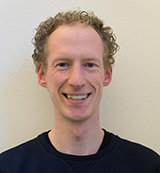Niels Reurings
I am currently working as a PhD candidate in the Structural Integrity & Composites chair of the Aerospace Structures and Materials section under the supervision of co-promotor dr.ir. Sotiris Koussios and promotor prof.dr.ir Rinze Benedictus.
I chose the ASM master track because one gets to work with concepts and materials that find their way into many high demanding applications, ranging from aerospace to sports to automotive (with the corresponding career options). To design such optimized structures requires advanced methods, which was the technical challenge I was looking for in a master track. What was a big plus for me personally was that within ASM, because of the lab laboratory and workshop, there are many possibilities to turn the design after the theoretical phase into tangible prototypes and test them.
When I got the opportunity for my MSc thesis to investigate both theoretically and physically the performance of an innovative composite concept outside its normal application environment, I took it. I like the idea of not knowing what the design would look like at the end. I really enjoyed working with the theoretical models down to the differential equations and then later getting the feel of the effects that are captured in them through actual physical testing. This meant also doing a substantial amount of hands-on work in the faculty laboratory: from design to manufacturing to problem solving and testing. It was this combination that I found both fun and valuable.
In my current position as a PhD candidate I am working on a completely different application of fibre-reinforced plastics compared to my thesis, it revolves around the application of regular fibre-reinforced composites at much higher temperatures than common through the introduction of a thermal barrier layer. The concept of this layer is still at an early stage so I get to develop both the understanding and the concept itself. Again, it includes the combination that I enjoy, namely that of modelling the behaviour and its subsequent experimental validation.
My advice would be to talk to staff members of the ASM group at any occasion, because the area of expertise within the whole of ASM is much larger than what is covered by the available courses. Much is possible and own initiative in this respect is always appreciated, so if you would like to work on a particular aspect or application ask around and you might be surprised by what you hear.
